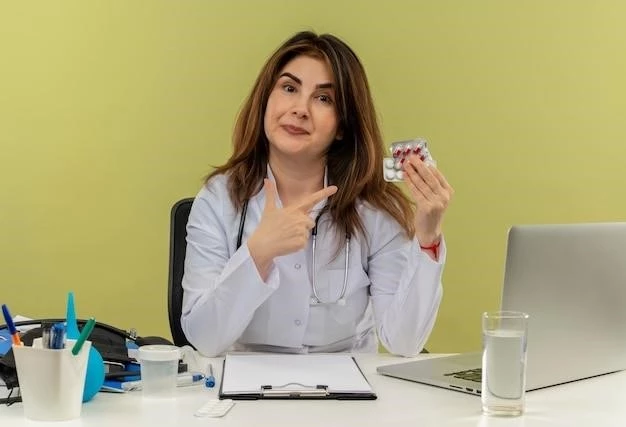Article Plan⁚ Side Effects of Drugs on Women’s Health
Exploring common drug interactions in women is crucial for understanding potential side effects. It is important to address prescription medication safety specifically tailored to women to ensure optimal health outcomes.
Common Drug Interactions in Women
There are several common drug interactions that women should be aware of to prevent adverse effects. Hormonal contraceptives may interact with certain antibiotics‚ reducing their effectiveness. Nonsteroidal anti-inflammatory drugs (NSAIDs) can interact with blood pressure medications.
Antidepressants‚ specifically selective serotonin reuptake inhibitors (SSRIs)‚ may interact with migraine medications leading to serotonin syndrome. Women taking oral contraceptives should be cautious with medications like St. John’s Wort‚ which can reduce contraceptive effectiveness.
Combining blood thinners with aspirin or NSAIDs can increase the risk of bleeding. Certain heart medications‚ when combined with antifungal drugs‚ can lead to irregular heart rhythms. It’s essential for healthcare providers to consider these interactions when prescribing medications to women to minimize risks.
- Be cautious with hormonal contraceptives and antibiotics
- Avoid combining NSAIDs with blood pressure medications
- Watch for interactions between SSRIs and migraine drugs
- Avoid St. John’s Wort with oral contraceptives
- Avoid combining blood thinners with aspirin or NSAIDs
- Take care with heart medications and antifungal drugs
Understanding these common drug interactions can help women make informed decisions about their health and medications‚ ensuring safer treatment outcomes.
Prescription Medication Safety for Women
Ensuring prescription medication safety for women involves considerations like dosage adjustments due to hormonal fluctuations during the menstrual cycle or menopause. Women often metabolize drugs differently from men‚ impacting efficacy and side effects.
Monitoring for adverse drug reactions is crucial‚ especially for medications like statins or blood thinners. Pregnant or breastfeeding women need specialized attention to avoid harm to themselves or their babies from drug exposure.
Healthcare providers should consider a woman’s age‚ weight‚ and underlying health conditions when prescribing medications. Communication about potential side effects and drug interactions is essential for women to make informed choices about their treatment plans.
- Adjust dosages based on hormonal changes
- Monitor closely for adverse reactions with statins or blood thinners
- Provide specialized care for pregnant and breastfeeding women
- Consider individual factors like age and health status
- Communicate effectively about side effects and interactions
By prioritizing prescription medication safety tailored to women’s unique needs‚ healthcare professionals can optimize treatment outcomes and minimize risks associated with drug therapy.

Antidepressants and Side Effects in Women
Antidepressants play a vital role in managing mental health conditions‚ but women may experience gender-specific side effects. Selective serotonin reuptake inhibitors (SSRIs) can impact libido‚ weight‚ and menstrual cycles in women.
Women are more likely to experience certain side effects like nausea‚ sexual dysfunction‚ or fatigue when taking antidepressants. It’s important for healthcare providers to monitor these effects closely and adjust treatment plans accordingly.
Pregnant women need special consideration when prescribed antidepressants due to potential risks to the fetus. Balancing the benefits of treatment with the risks of side effects is crucial in managing depression or anxiety in women.
- SSRIs can affect libido‚ weight‚ and menstrual cycles in women
- Women may be prone to nausea‚ sexual dysfunction‚ and fatigue with antidepressants
- Close monitoring and treatment adjustments are essential
- Special consideration for pregnant women to minimize fetal risks
- Balance benefits and risks when treating depression or anxiety
By understanding the specific side effects women may experience with antidepressants‚ healthcare providers can provide more personalized care and support to optimize mental health outcomes.
Medicines in Development for Women’s Health
Ongoing research and development efforts are focused on creating innovative medications to address women’s unique health needs. These medicines aim to provide improved treatment options with fewer side effects and better efficacy.
One area of interest is the development of hormone replacement therapies with enhanced safety profiles for menopausal symptoms. Another focus is on developing targeted therapies for conditions like endometriosis‚ osteoporosis‚ and breast cancer that primarily affect women.
Researchers are also working on novel contraceptives with improved effectiveness and fewer adverse effects. New developments in personalized medicine hold promise for tailoring treatments to individual women based on their genetic makeup and specific health risks.
- Enhanced hormone replacement therapies for menopausal symptoms
- Targeted treatments for endometriosis‚ osteoporosis‚ and breast cancer
- Innovative contraceptives with improved effectiveness
- Advancements in personalized medicine for individualized treatments
By investing in the development of new medicines for women’s health‚ researchers and healthcare providers aim to ensure better outcomes‚ increased safety‚ and improved quality of life for women worldwide.
Drug Risks and Women’s Health
Women may face unique risks when taking certain medications‚ underscoring the importance of understanding and addressing these concerns for optimal health outcomes. It’s crucial to consider factors such as hormonal fluctuations‚ reproductive health‚ and metabolism in women.
Some medications‚ like bisphosphonates used for osteoporosis‚ may have different effects on women’s bone health compared to men. Women experiencing menopause need special attention when prescribed hormone therapies to manage symptoms effectively while minimizing risks.
Antibiotics can disrupt the balance of vaginal flora‚ leading to yeast infections in women. Psychotropic medications may have different effects on women’s mental health compared to men‚ requiring close monitoring for adverse reactions.
- Consider hormonal fluctuations and reproductive health
- Special attention needed for hormone therapies in menopausal women
- Be cautious with antibiotics and vaginal flora balance
- Monitor closely for psychotropic medication effects on women’s mental health
By recognizing and mitigating the specific drug risks that women may face‚ healthcare providers can tailor treatments to ensure safe and effective care‚ promoting overall well-being and health for women of all ages.
